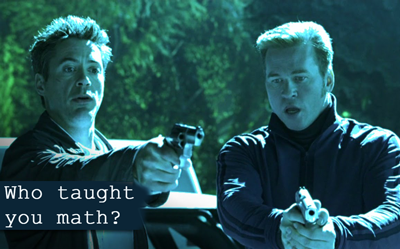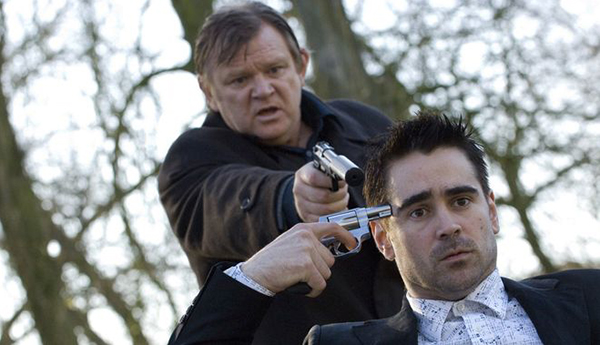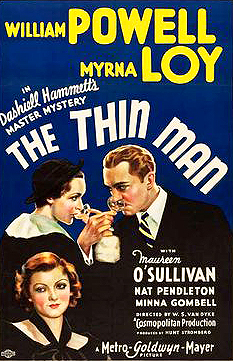Thriller/Comedy is a subgenre no one talks about but everyone wants. You can’t filter movies on Netflix and Box Office Mojo for it, but it certainly exists.
As the resident script analyst for Epiphany Space in Hollywood, I ran Film Appreciation Night (FAN) to build community and discuss movies we love. Plus, I feel it’s my responsibility to help young writers gain a firm understanding of the movies they are trying to write.
So I began with Thriller/Comedy movies.
Remember, genres developed as signposts for audience expectations. People don’t go to movies for titles or situations, but for visceral emotions.
Want thrills and excitement? Want laughs too?
Behold, the thriller/comedy. The following shows many (possibly the BEST) ways in which filmmakers played with this exciting, funny subgenre.
Edgar Wright’s Hot Fuzz
True story: when I’m in a room with budding screenwriters, I frequently ask what kind of films they want to make (and I ask a lot). I don’t hear Billy Wilder or Lubitsch, David Lean or Howard Hawks. But EVERY time I hear the name Edgar Wright. Specifically, Baby Driver (yes, it’s the music).
His Hot Fuzz may top many viewer’s “Buddy Action” movies, but I’ll tell you, it’s a thriller comedy.
The two subgenres have many things in common, but there’s one primary difference: a buddy action movie has trained heroes (cops, detectives, military) chasing baddies, so they’re uniquely qualified for the task before them. A thriller protagonist, however, is usually uniquely UNqualified for the conspiracy in which he finds himself.
For example, in North by Northwest (the quintessential thriller with only incidental comedy), advertising man and social drinker Roger Thornhill finds himself hunted by killers who think he’s an international spy!

In Hot Fuzz, Nicholas Angel is an over-qualified London cop placed in a “fish-out-of-water” country town, making him unqualified. Edgar Wright drives this home by teaming Angel with a silly, buddy-action flick loving partner, Danny.
Both of these heroes are unqualified for the series of “accidents” (AKA “murders”) in their sleepy town.
Oh, another facet of thrillers: the “close/open” concept. It breaks down as follows:
- Open Thrillers: one in which the audience knows who the villain is. Movies like Single White Female and TV shows like Columbo fit this model.
- Closed/Open Thrillers: one in which the audience and protagonist discover at around the midpoint what the real stakes of the movie are, and who the main villain is. Movies like North by Northwest and LA Confidential fit this model, and it’s the most common.
- Closed Thrillers: ones in which the villain is kept a secret until the final act, typically called “Whodunits” because they end with the detective assembling the clues, addressing the room of suspects and ultimately pointing the condemning finger.
What made Hot Fuzz stand out was its glorious “cascading” closed/open reveal. Angel thinks he’s got his man… Except he can’t convince anyone (ahem, that motivation puts us in the thriller genre).
Then he discovers it’s a conspiracy: the town leaders are in on it!
The whole town is in on it! And the police chief!
Even Danny is in on it! (surprise!)
While each scene is structured for a thriller, the characters, dialog, and especially Edgar Wright’s playful direction suggest broad comedy.
That is a winning combination.
The other thing my FAN group remarked about was empathy. While some movies don’t elicit our sympathy, we quickly cared about Angel and Danny. We invested in Angel’s desire for justice.
For those who want to argue that this is still a buddy/action movie… Fine. Perhaps. But consider that Angel is more “fish-out-of-water” than, say, Axel Foley of Beverly Hills Cop. Axel is an action hero, determined to solve the case and not just trying to get others to believe him.
Angel spends 2/3rds of the story trying to convince others there’s something going on, and only turns into an action hero for the climax.
For plot wonks, yes, Danny’s complicity is hard to swallow, not just for Angel playing along with being stabbed, but especially the logic of the townfolk letting Danny dispose of Angel when they never allowed him to do so before.
Had I consulted on Hot Fuzz, that would be on my “to fix” list. But I wasn’t and it’s near-perfect anyway.
Shane Black’s Kiss Kiss, Bang Bang
I can’t do a thriller/comedy series without tipping my hat to the man who handed us the modern buddy action template. I’m talking, of course, about Shane Black, and his Lethal Weapon. But as funny as Murtaugh and Riggs are, the flick that fits our thriller/comedy mold is Shane’s first directorial effort, Kiss Kiss, Bang Bang.
Our protagonist (and unreliable narrator) Harry is not a cop, but a bumbling crook sent to Hollywood for a screen test.
He then gets a buddy/mentor: an actual gumshoe, Gay Perry, along with a twisty conspiracy plot (closed/open, though it opens late), giving us time to watch them insult one another and slowly uncover bizarre clues.

If Hot Fuzz is rock, KKBB is alt-rock. It’s a little more “off.”
Kiss Kiss, Bang Bang is also a “screenwriter’s movie,” full of inside jokes, and beats that go against expectation. Shane’s twists actually become a distraction after a while, but for those familiar with Raymond Chandler and other private eye fiction, this film is candy.
I personally thought that the story was weak in several places. Major plot turns occur without Harry’s intervention (protagonists are supposed to be prime movers in their story) and one sequence turns while Harry is unconscious.
The final confrontation with Gay Perry and Harmony’s dad should have been for Harry. After all, Harry is the moral center for the audience, and it’s his story arc we follow, so it’s his job, not Gay’s.
But it’s clearly worth the ride, and like Hot Fuzz, it pays homage to the other giants of the action and thriller genre. Shane’s The Nice Guys is another example.
Guy Ritchie’s Lock, Stock and Two Smoking Barrels
Next, we tackled the Guy Ritchie crime farce. This is a different kind of thriller/comedy because a farce requires such tight plotting.
A farce involves a trickster protagonist entering into a scheme that inevitably goes awry. The trickster spends the rest of the tale trying to keep the clockwork of mayhem from blowing up. But the plot will have its way, and these machinations will ultimately solve the story conflict(s) as multiple forces contend, clash, and ultimately crash.
We also expect from farce more physical and cruel comedy than its witty comedy cousins.
Guy Ritchie’s Lock Stock cranks up the farce into the seedy UK underworld. His protagonists enter a card game with all the money they can scrape together in the world, with the hope of gaining 20%. They end up a half million pounds in debt and one week to pay it back before the crime boss starts cutting off their fingers. So, they try to rob the criminals next-door, who are in a dope-stealing scheme of their own.
The result is a jaw-dropping finale that left many of my FANs in awed silence.
Unlike the previous movies that were structured for thriller and played for laughs, Lock Stock is structured in this rare form of comedy and pushes us into thriller.
To get a better picture, compare the broad farces of It’s a Mad Mad Mad Mad World, and Rat Race, with Guy’s other comedy/farce, Snatch.
Martin McDonagh’s In Bruges
Bouncing to the other end of the subgenre spectrum, Martin McDonagh, who more recently gained acclaim for Three Billboards Outside Ebbing, Missouri, should be more known for his first best work: In Bruges.
As I explained to the FAN group, Martin, unlike Guy Ritchie, doesn’t focus on plot. He creates hitman characters with interesting wounds and motivations, and feels his way along. He allows the comedy to come through the arguments between Ken and Ray, and how their particular worldview conflicts with others caught in their path.
The result: In Bruges feels like a drama, albeit a very funny drama, until the third act, when the thriller (with witty banter) kicks into high gear.
While researching, I also discovered that Martin’s greatest influences include the playwrights David Mamet and Harold Pinter. Pinter’s defining work, The Dumb Waiter, stood out:
The Dumb Waiter is about two hitmen waiting for the next assignment in a basement. They discuss the newspaper and banter jokes about until the dumb waiter arrives with the message, after the younger one leaves. Their next hit is about to reenter. The younger hitman reenters, revealing that he is the intended victim. Curtain falls.
I made the point that Martin must have been dissatisfied with the play, and decided to improve it by extending the drama. Bruges replaces the basement, and becomes purgatory for his hitmen, Ken and Ray, waiting for Harry’s judgment.
I found the first act remarkable. Martin forces us to plod around with Ray, the reluctant tourist, making us care for him, before dropping the anvil: they’re in Bruges because Ray killed a kid.

The first part of Act II is still funny but it’s heavy with Ray’s guilt, with his suicidal thoughts, and Ken’s burden of what to do about it.
Ken’s eventual choice to help Ray make him a sacrificial hero/mentor in the story.
More importantly for Martin McDonagh, this drama-based zaniness gives these killers, unlike most characters in any other genre, the ability to debate deep moral consequences without boring the audience.
It’s what makes the scene of Ken taking Harry up the tower so powerful.
In my Pre-Script Pro-Strategy class, I talk about “elevating” genres and other story elements, to raise stories above the mediocre, beyond the two-hour diversion and into something memorable, meaningful.
Well, In Bruges‘ ability to confront the depth of guilt and consequence makes it a truly transcendent story, one that gives the audience something deeper and profound.
It wasn’t lost on me, however (for the plot wonks out there), that Harry took an awfully long time to get down those stairs. More likely, he would have popped out in front of Ray and shot him without the chase. But then we would have missed Harry’s shocking comeuppance.
Dashiell Hammett’s The Thin Man
Now that I’ve established my modern thriller/comedy bona fides, we turn our attention to the man who started the witty gumshoe detective trope, the father of Film Noir, the writer of The Maltese Falcon, Red Harvest, and The Thin Man: Dashiell Hammett.
Dashiell ran away from home at 13, worked for the Pinkerton Detective Agency as a Union Buster, caught TB in WWI, and after years of writing stories – and supporting left-wing communist causes – got blackballed in Hollywood. He died in 1961, 25 years after writing his last novel, The Thin Man.

The 1934 movie of a happily married, alcoholic detective quipping his way through a murder case with his bubbly wife and little dog, Asta caught Hollywood off guard. Nick and Nora (William Powell and Myrna Loy) went on to make six sequels, with Dashiell as a script consultant.
Of the movie itself, our group noticed that Nick and Nora were not only funny, but were also part of the coming naturalistic style of acting we’re used to. Most of the other actors of the time, and even in the same movie, were stuck in melodrama, a stagey over-acting.
As such, The Thin Man doesn’t age well except for Nick and Nora, but the spirit of thriller/comedy is intact.
Plus, this is also an example of a “closed thriller,” where the detective reveals the murderer at the end. The best/latest example to consider is Knives Out.
Stanley Donen’s Charade
Lastly, I showed my FAN group the Cary Grant/Audrey Hepburn classic, Charade. The movie is considered a unique hybrid of whodunit suspense thriller, spy thriller, romantic comedy, and screwball comedy. It has also been referred to as “the best Hitchcock movie that Hitchcock never made.”
Director Stanley Donen was a studio choreographer for Hollywood musicals in the 1950s, became a director of musicals, and advanced the integration of songs as a continuation of the story. He directed Singin’ in the Rain and Seven Brides for Seven Brothers, among others. By the end of the 1950s, Donen saw musicals declining, and so he made the shift to comedy. But first, as a lover of Hitchcock films, he wanted to make his own North By Northwest.
That was Charade.

Audrey plays a widow who can’t find the $250k her husband left her. Too bad three thugs, the CIA, and a charming but mysterious Cary Grant are also after the dough.
Interesting tidbits: Audrey used the word “assassinate” twice in the movie, but because Charade’s 1963 release was too close to the Kennedy assassination, the words were redubbed as “eliminate.”
Also, the “screwball” elements came about in a rewrite. The original script had Cary pursuing Audrey, but Grant felt uncomfortable with the romantic interplay because at 59, he was 25 years older than Audrey (33). So, the writers used a screwball defense and made Audrey the pursuer. (In Hollywood, a screwball comedy is one in which the life-affirming woman resurrects a calcified man. Bringing Up Baby – also with Cary Grant! – is the textbook example)
The FANs thought the change worked. While Audrey’s character is a bit scattered, falling for Cary Grant made sense.
We did have a bit of discussion over the timeline, however. If these former soldiers pursued Voss for almost 20 years, how is it they never ran into Dyle before? How did Dyle manage to sneak into the hotel and kill Scobie (spoiler!) without anyone noticing? These are things people think about on the ride home.
That said, Charade‘s fabulous ending chase, reveal, chase finale, resolution and second reveal, come together perfectly to end our thriller/comedy series.
Conclusion
So, that’s my introduction to the thriller/comedy. Yes, I didn’t mention Freebie and the Bean, Smokin’ Aces and many others, but these give you a sense of what can be done.
What did you think? Can you think of another that twists this exciting and funny subgenre another direction?
